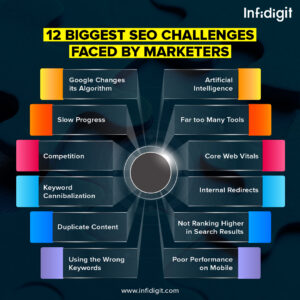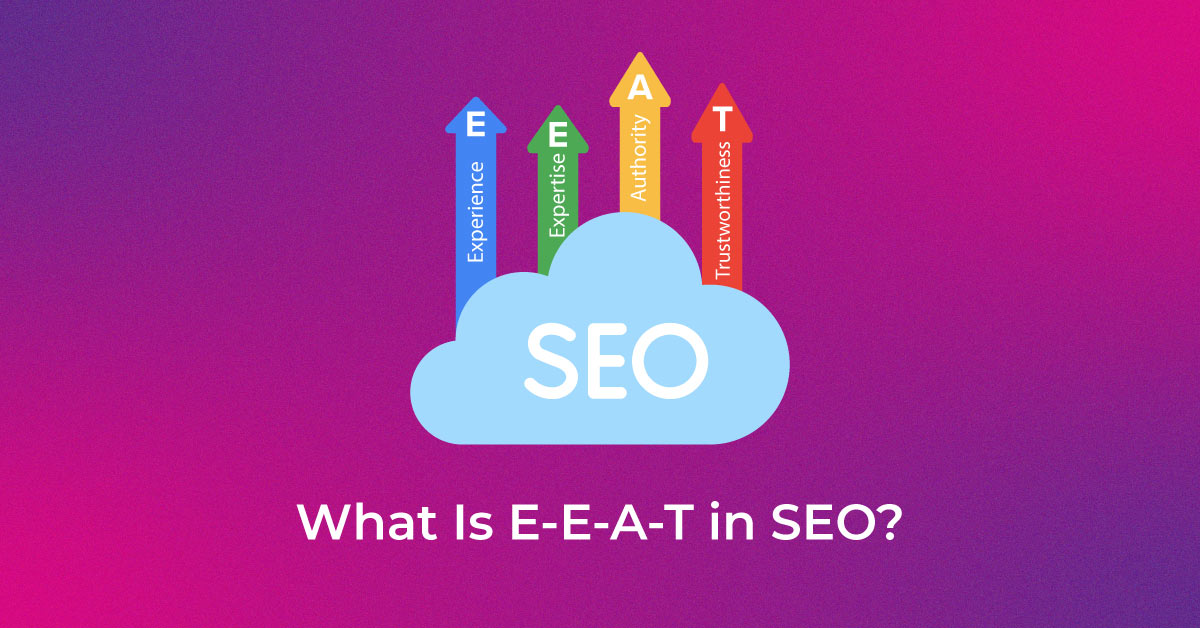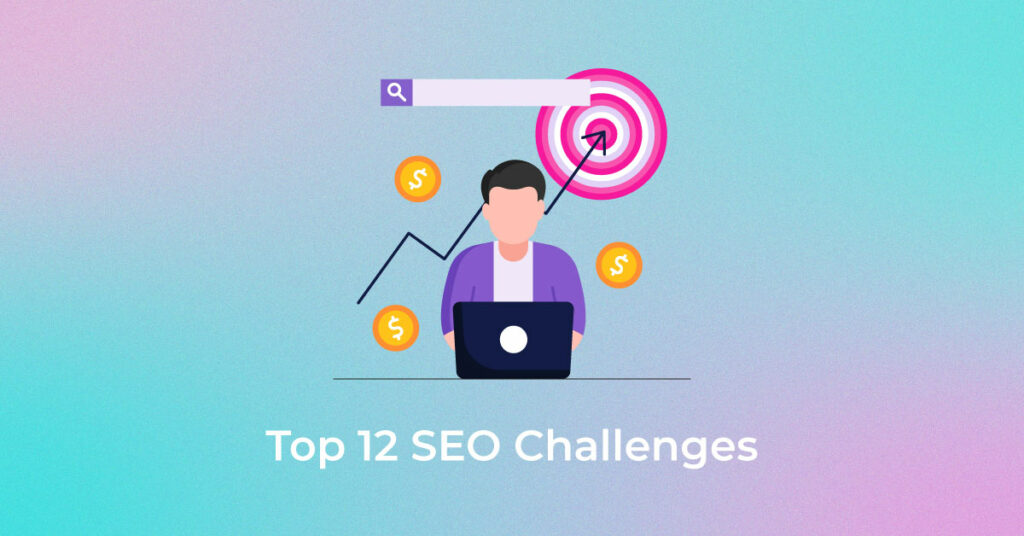|
Getting your Trinity Audio player ready...
|
The evolution of SEO has been driven by changes in user behavior and search engine algorithms. As search engines have become more sophisticated and users have become more accustomed to using search engines to find information and products, SEO has become increasingly complex and nuanced.
In the early days of SEO, keyword stuffing and low-quality backlinks were among the effective strategies for improving search engine rankings. But today, these tactics are of no use. Here is the list of challenges that SEO experts face.

Google changes its algorithm
Google changes its algorithm frequently, affecting the ranking of your website while requiring you to adjust your SEO strategy accordingly. Google algorithm updates can be significant or minor and can be tailored to specific types of websites or search queries. For example, Google may release updates prioritizing mobile-friendly websites or penalize websites with low-quality backlinks. These changes can significantly impact your website’s search engine rankings and traffic.
To stay ahead of Google’s algorithm changes, prioritize white hat SEO techniques and avoid spammy or manipulative tactics that can result in penalties. Stay up-to-date with industry news and regularly monitor your website’s performance to identify changes in your search engine rankings.
Artificial intelligence
One of the most significant challenges of AI for SEO is the shift toward natural language processing. AI-powered search engines can now understand and interpret the context and intent of a user’s search query rather than relying on keyword matching alone. That means the websites must produce high-quality content relevant to users’ queries rather than simply stuffing their pages with keywords.
Another challenge is the rise of voice search, which has become increasingly popular with the growth of smart assistants like Siri and Alexa. Voice search queries are typically longer and more conversational, requiring websites to optimize for long-tail keywords and natural language.
Slow progress
Slow progress is one of the biggest challenges for SEO because it can be difficult to see significant results in a shorter period. SEO is a long-term strategy that requires ongoing effort and optimization, and it can take months or even years to see noticeable progress.
To accelerate your SEO progress, you should focus on quick wins and prioritize the most crucial elements of your strategy. This may include optimizing your website’s on-page aspects, targeting long-tail keywords with lower competition, and focusing on building high-quality backlinks from authoritative websites. You may also opt for PPC campaigns for quick results.
Far too many tools
With too many tools, managing and integrating data from various sources becomes difficult, resulting in data fragmentation. It leads to discrepancies in the analysis and interpretation of data, hampering decision-making processes.
Additionally, too many tools can lead to information overload, where users struggle to filter out relevant information from irrelevant noise. It can cause cognitive overload, reducing productivity and increasing the likelihood of errors. Another challenge is the high cost of acquiring and maintaining multiple tools, which can strain the budget of small businesses and startups.
You can overcome these challenges by evaluating the benefits and costs of each tool and prioritizing those that provide the most significant value.
Competition
Competition is one of the most difficult challenges for SEO because the number of websites competing for similar keywords and search queries is increasing. This makes ranking high in search results and attracting targeted traffic to your website difficult.
To differentiate yourself from your competition, you should focus on creating unique and valuable content that provides value to your target audience. You must prioritize building relationships with other websites and influencers in your industry to earn high-quality backlinks and boost your website’s authority.
Core Web Vitals
Core Web Vitals is a set of metrics introduced by Google to measure user experience. These metrics include loading speed, interactivity, and visual stability of web pages, and they play a crucial role in determining a website’s ranking on search engine result pages.
Core Web Vitals pose a significant challenge for SEO professionals, requiring them to optimize for both user experience and search engines simultaneously. A thorough understanding of how these metrics work and their impact on website performance is necessary if you hope to use it to your advantage.
Another SEO challenge is the constantly changing nature of these metrics, which require constant monitoring and optimization to maintain a website’s ranking. Moreover, the changes in these metrics can cause fluctuations in website rankings, leading to uncertainty and instability in the SEO process.
Keyword Cannibalization
Keyword cannibalization is a situation where multiple pages on a website compete for the same keyword. The scenario can confuse search engines and reduce the visibility and ranking of web pages on search engine result pages. It can also dilute the relevance and authority of a website.
To overcome this challenge, SEO professionals must perform an in-depth website audit to identify instances of Keyword Cannibalization. They must then consolidate and optimize their content, ensuring each page targets a unique set of keywords that align with their business goals and target audience.
Internal Redirects
URL changes can cause internal redirects, automatically directing old URLs to new ones. But excessive redirect chains can hinder SEO by slowing loading times and creating a bad user experience. The scenario happens when a single URL is redirected multiple times before reaching its final destination, leading to slower loading times and a poor user experience.
Moreover, internal redirects can also cause crawl budget wastage, as search engines may spend too much time crawling through redirect chains, leaving less time to crawl other pages on the website. Another challenge is the risk of redirect loops, where two or more pages are redirected to each other, causing search engines to get stuck in an infinite loop and not crawl any further.
Duplicate Content
Duplicate content is another challenge for SEO because it can negatively impact your website’s search engine rankings. When search engines crawl your website and find multiple pages with the same content, they may not know which page to prioritize in their search results. Search engines also consider duplicate content as a form of spam and may penalize websites that use it.
To avoid duplicate content issues, ensure that each page on your website contains unique and valuable content. When multiple pages have similar content, use canonical tags to indicate the preferred version. Furthermore, avoid using boilerplate text, scraped content, or syndicated content, as these can be considered a duplicate.
Not ranking higher in search results
Most search engine users click on one of the first few results that appear on the search engine results pages (SERPs). You may lose significant traffic, leads, and revenue if your website does not rank highly for relevant keywords.
Ranking highly in search results requires a comprehensive SEO strategy that includes optimizing your website for keywords, building high-quality backlinks, and creating valuable and engaging content. It also requires ongoing monitoring and optimization to stay ahead of your competition and keep up with changes in search engine algorithms.
Using the wrong keywords
Wrong keyword utilization can lead to a mismatch between the content on your website with the search queries that users use to find information. When you use the wrong keywords, search engines may not be able to properly index and rank your content, resulting in lower search engine rankings and reduced traffic to your website.
To avoid this issue, you should conduct thorough keyword research to identify the keywords and phrases relevant to your content and target audience. Additionally, you should avoid using irrelevant or spammy keywords that can negatively impact your website’s search engine rankings.
Poor performance on mobile
Mobile devices now account for a large portion of internet traffic. If your website is slow to load or difficult to navigate on a mobile device, users are likely to leave, and search engines may penalize your website for providing a poor user experience.
Server response time, page load speed, and website design impact mobile performance. You should prioritize mobile-first design and optimize your website for speed and usability on mobile devices to improve mobile performance. This includes employing responsive design, optimizing images, and limiting the use of third-party scripts.
Conclusion
The 12 biggest SEO challenges present significant obstacles for businesses and marketers looking to improve their search engine rankings and attract targeted traffic to their websites. From duplicate content to slow progress, competition to changes in search engine algorithms, these challenges require a comprehensive and effective SEO strategy that prioritizes high-quality, valuable content and a focus on user experience.
Popular Searches
How useful was this post?
4.8 / 5. 4













